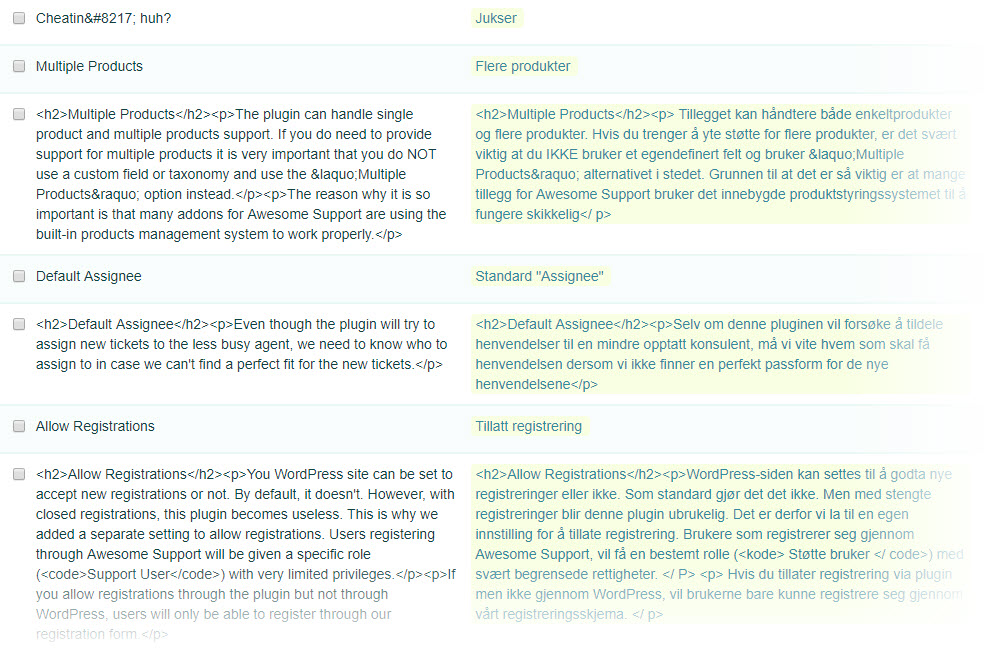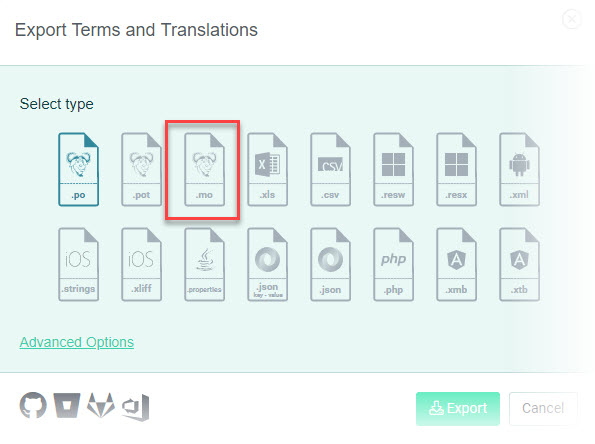Using POEDITOR.COM For Translations
Awesome Support submits its translation catalog to PoEditor.com which allows users to directly translate strings and then download the translations in the file format that WordPress requires. The core translation project can be found here: https://poeditor.com/join/project/P6HgfPnBt4
Once you’ve signed up and been granted access to the project. Your translation screen will look similar to the following:
The left side will show the strings to be translated and the right side is where you’ll enter your translation. You can then quickly run through the strings and add your translation.
Download The Translations
After you have completed your translation, you can download them in one of many formats. WordPress expects that the translations be in the MO file format. When you choose the option to export your translations you will see a screen that looks similar to this one:
Choose the MO file format – in the image above its the one with the red box. Many users also choose to download the PO file format – this is the human-readable text file that can be edited in any text editor.
Move The File To Awesome Support
Once the file is downloaded you need to RENAME it and then upload it to the awesome-support/languages folder on your WordPress server. The filename needs to in the following format:
awesome-support-languagecode.mo
The key thing here is to use the language code that WordPress expects for your language. Sometimes the language code is 2 characters and sometimes it is 4 or 5. You can find the full list of language codes on the WordPress site here: https://make.wordpress.org/polyglots/teams/
So, for example, a Hindi translation file will be named awesome-support-hi_IN.mo. Since there are multiple locales for French, that file might be named awesome-support-fr_BE.mo or awesome-support-fr_CA.mo or awesome-support-fr_FR.mo depending on the locale.
Add-on File Names
The name of the file for add-ons will depend on the name of the add-on. You can see the name of the existing basic POT file in the languages folder and use that name as the root name. So, for example, the email piping languages folder contains the file as-email-support.pot. The root name is as-email-support. So your language file name would be as-email-support-languagecode.mo
More Information
Find out more about WordPress translations here: https://codex.wordpress.org/I18n_for_WordPress_Developers and here: https://wpgeodirectory.com/loading-wordpress-language-files-correctly/
More Topics In Awesome Support Core
- Awesome Support
- How To Create A Ticket On Behalf Of The Client?
- What's New In Awesome Support
- Installation
- Post Installation – What You Need To Know (Quick Start)
- Post Installation - Enter Your First Ticket (As A Customer)
- Post Installation: Adjust Security
- Basic Admin: Add An Agent
- Basic Admin: Turn Off Ticket Assignment To An Agent
- Agent Functions: Manage The Ticket List
- Agent Functions: View All Tickets
- Agent Functions: Navigate To A Ticket (View Ticket)
- Agent Functions: Explore The Ticket Interface
- Agent Functions: Reply To A Ticket
- Agent Functions: Close A Ticket
- Agent Functions: Add An Internal Note (Premium)
- Agent Functions: Track Time Spent On A Ticket (Basic)
- WPML and POLYLANG
- ADMIN: Overview
- ADMIN: User Registration Options
- ADMIN: Configure Products
- ADMIN: Synchronize Products With WooCommerce And Easy Digital Downloads
- ADMIN: WooCommerce Integration (Basic)
- ADMIN: Configure Departments
- ADMIN: Configure Email Alerts
- ADMIN: Email Template Sets
- ADMIN: Configure Priorities
- ADMIN: Configure Channels
- ADMIN: Configure Status Colors
- ADMIN: Short Codes And Pages
- ADMIN: Multiple Agents Per Ticket
- ADMIN: Basic Time Tracking
- ADMIN: Misc Display Options For Agents and Admins
- ADMIN: Misc Display Options For Customers (Front-end Users)
- ADMIN: Misc Display Permissions
- ADMIN: Misc Display Options (Advanced)
- ADMIN: File Upload Options
- ADMIN: Deleting Attachments (Manual and Automatic)
- ADMIN: Advanced System Options
- ADMIN: Audit Trail Options
- ADMIN: Handling Existing Users After Installation
- ADMIN: Roles And Capabilities
- Roles and Capabilities Table
- ADMIN: Roles And Capabilities In Add-ons
- ADMIN: WP-CONFIG Options
- ADMIN: Multiple Ticket Forms
- ADMIN: Multi-Vendor Marketplaces
- Multisite Considerations
- Known Plugin Incompatibilities and Conflicts
- Cookies


